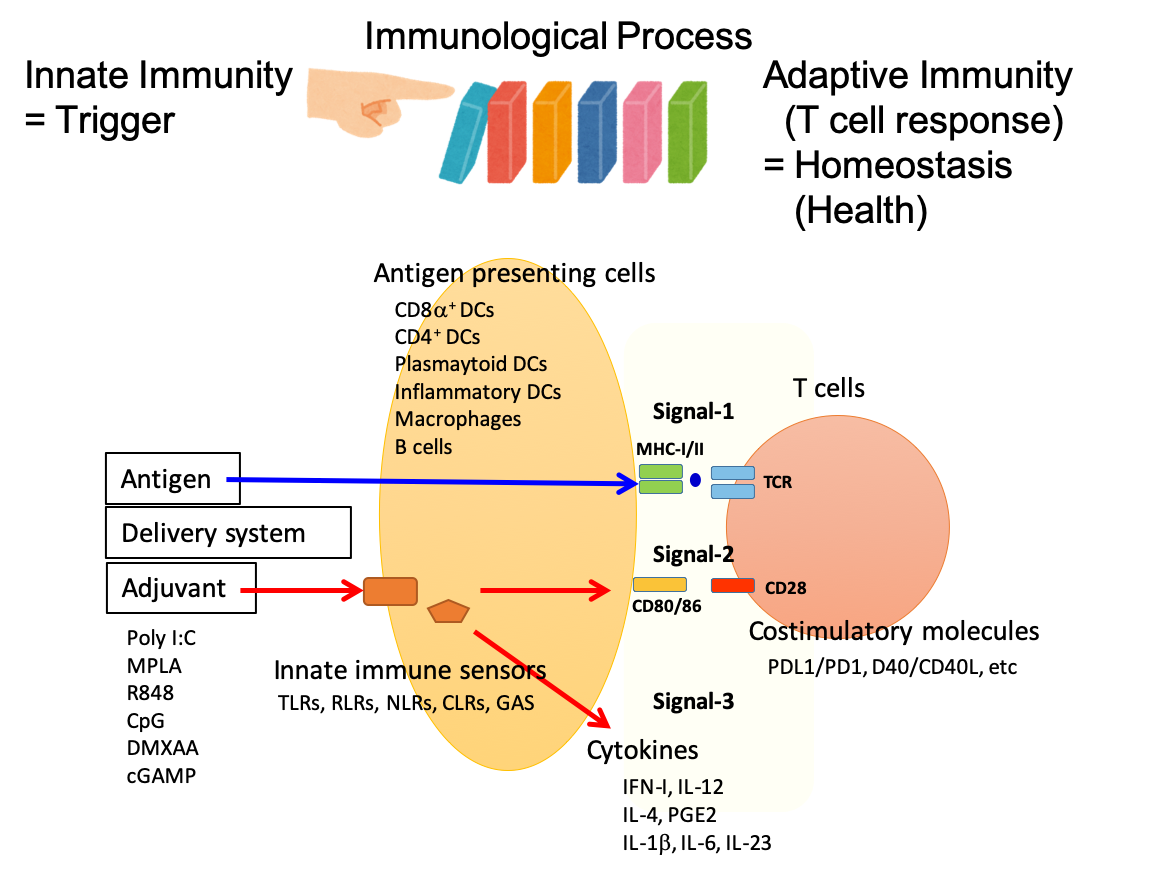/Endowed Chair Department of Cellular Immunology
Cellular Immunity by T cells play important roles for cancer, infectious diseases, allergy, and autoimmune diseases. Therefore, T cells are good medical target. Appropriate induction or reduction of T cells help to overcome and control these diseases. In our laboratory, we are developing new drug and technology which utilize built-in mechanisms of T cell response induction in our body, especially from the point of views of adjuvant, antigen presenting cells, and T cell epitopes.
Effective induction of T cell responses needs appropriate sequential immunological processes including 1) innate immune response induction by adjuvant, antigen uptake and processing by antigen presenting cells, and effector T cell activation by recognizing peptides (T cell epitope) bound on MHC molecules. However, the details of these sophisticated and complexed immunological processes are still not fully understood yet.
We are trying to understand the details of T cell response induction processes from the initial innate immunity to final adaptive immunity. We believe our research provide critical information to utilize built-in cellular immunity mechanisms in our body for real medicine. Controlling and adjusting the T cell responses depending on the conditions and diseases (like cancer) will provide very effective but gentle treatment and help medical health promotions.
Patient cancer-derived xenografts (PDX) are heavily used worldwide in therapeutic research, pharmacological validation of nonclinical models because they retain the diversity and heterogeneity of the patient's own cancer. Our laboratory has created novel PDXs and is working to elucidate the biological environment surrounding cancer from both PDX tissue and transplanted host mice, and to contribute to the development of anti-cancer drugs.
Staff
- Endowed Assoc. Prof.: Shigeki Adachi
- SA Assoc. Prof.: Takahiro Tougan
Publications
- 1) The Tumor Growth Inhibitory Effect of a Standardized Extract of Cultured Lentinula edodes Mycelia Using Patient Derived Xenograft Model. Yoshii R. et al., Biol Pharm Bull. (2024)47(2):532-538.
2)Detection of histidine-rich protein 2- and/or 3-deleted Plasmodium falciparum using the automated hematology analyzer XN-31: A proof-of-concept study. Tougan T., et al., Parasitol Int. (2022)91:102648.
3) Microfluidic-prepared DOTAP nanoparticles induce strong T-cell responses in mice. Haseda Y., et al. PLoS One. (2020) 15(1):e0227891.
4) Lipid nanoparticles of Type-A CpG D35 suppress tumor growth by changing tumor immune-microenvironment and activate CD8 T cells in mice. Munakata L., et al. J Control Release. (2019) 313:106-119.
5) Development of Nonaggregating Poly-A Tailed Immunostimulatory A/D Type CpG Oligodeoxynucleotides Applicable for Clinical Use. Aoshi T., et al. J Immunol Res. (2015) 316364.
6) Bacterial entry to the splenic white pulp initiates antigen presentation to CD8+ T cells. Aoshi T., et al. Immunity. (2008) 29(3):476-86.








